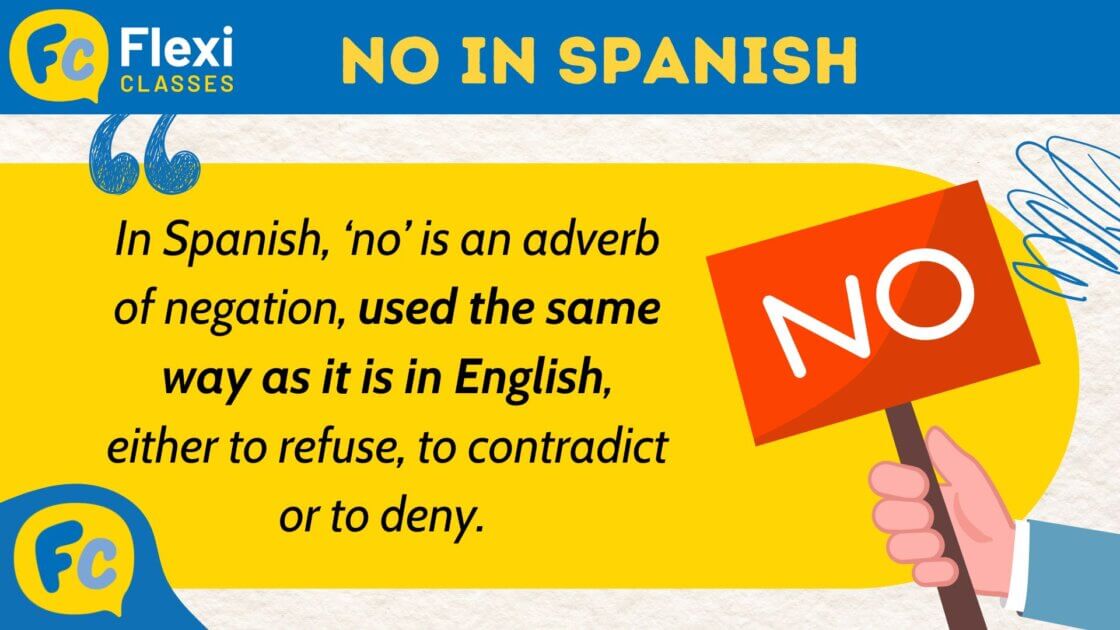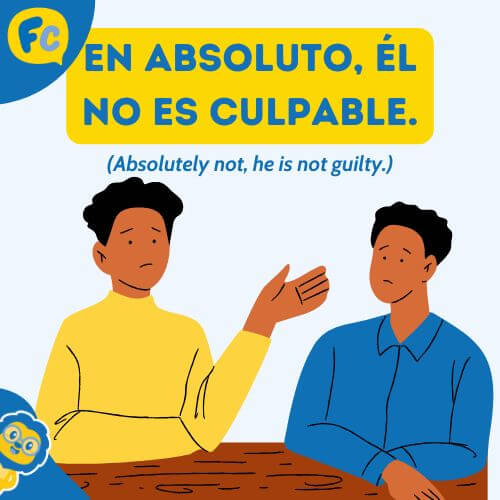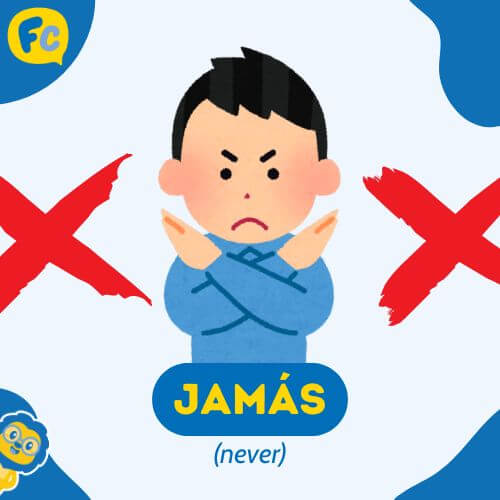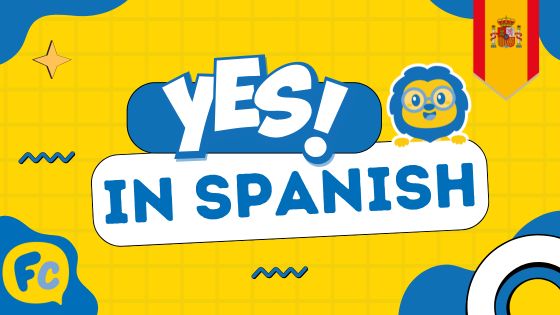Saying No in Spanish – When No Doesn’t Necessarily Mean No
No in Spanish Formal Expressions, Slang and Indirect Refusals
A straightforward ‘no’ in Spanish is said the same way and just as directly as it is in English, no.

❌ However, a negative response in Spanish is often adorned and embellished with complementary words that either mitigate or strengthen the negation.
There are numerous ways to say no in Spanish, ranging from formal expressions to everyday slang or informal phrases to polite and indirect refusals.
👉 So let this be your ‘no’ guide and pick up the subtleties, contexts and meanings behind the different ways of saying no in Spanish.
✨ Let’s break down ‘No’ in Spanish!✨
No in Spanish || The Elementary No
No in Spanish || No – Formally Speaking
No in Spanish || No – Everyday Expressions
No in Spanish || No – How to Politely and Indirectly Decline
No in Spanish || No – When It’s Wishy-Washy
No in Spanish || Quiz
No in Spanish || FAQs
No in Spanish || The Elementary No

👉 An upright ‘no’ in Spanish is valid for any context of use – formal or informal, although a few accompanying expletives are always appreciated, like in these examples, which come across as more formal ways of saying no:
When refusing
No, gracias (No, thank you). See example:
¿Te apetece un café?
(Would you like a coffee?)No, gracias, ya me he tomado uno.
(No, thank you, I already had one.)When denying (vehemently)
En absoluto (Absolutely not).
En absoluto, él no es culpable. (Absolutely not, he is not guilty.)

When denying (less vehemently)
No es así (equivalent to saying ‘That’s not the case’ or ‘It’s not like that’), like in this conversational example:
Llegaste tarde.
(You arrived late.)No es así, llegué cinco munutos antes.
(That’s not the case, I arrived five minutes early.)When contradicting
Me temo que no (I’m afraid not), like in the example:
Hay que girar a la izquierda.
(You have to turn left.)Me temo que no, hay que girar a la derecha.
(I’m afraid not, you have to turn right.)
8 Ways to Say Hi in Spanish – Say Hello Like a Local
Different Ways of Saying Hi in Spanish, Fit for Each Occasion! There are many ways to say hello in Spanish, based on several factors… Is it a formal or an informal occasion? Are you close friends or have you just…
No in Spanish || No – Formally Speaking

Sometimes, we want to avoid appearing too casual.
This could be when speaking to a boss, a person older than you, or simply when you’d like to appear more respectful to someone in any given situation.
👉 When saying ‘no’ in Spanish in a formal context, it is always advisable to adorn the basic ‘no’ either with some cushion or reinforcing words, like in the examples below:
A tempered ‘no’
Me temo que no (I’m afraid not), see the example below:
¿Vendréis a cenar?
(Are you all coming for dinner?)Me temo que no podremos ir a la cena.
(I’m afraid we will not be able to attend the dinner.)No va a ser posible (It’s not going to be possible), like in the example below:
¿Podemos reunirnos mañana por la mañana?
(Can we meet tomorrow morning?)No va a ser posible, tengo otra reunión.
(It won’t be possible, I have another meeting.)No va a poder ser (It’s not going to happen)
Querría la entrega para el fin de semana.
(I would like the delivery for the weekend.)No va a poder ser, ya temenos la agenda llena.
(That’s not going to be possible, our schedule is full already.)A reinforced ‘no’
En absoluto (Absolutely not), like in the example:
¿Vas a comprarte la casa?
(Are you going to buy yourself the house?)En absoluto.
(Absolutely not.)De ninguna manera (There’s no way/no way)
¿Vamos andando al restaurante?
(Let’s go walking to the restaurant?)De ninguna manera, está a dos kilómetros.
(No way, it’s two kilometers away.)Bajo ningún concepto (Under no circumstance)
Bajo ningun concepto debes revelar la sorpresa. (Under no circumstance must you reveal the surprise.)
Jamás (Never)

¿Has fumado alguna vez?
(Have you ever smoked?)Jamás.
(Never.)
Yes in Spanish – Get Creative With Your Spanish Affirmations ✔️
The Many Ways To Say Yes in Spanish – Formally and Informally ⁉️ Did you know? Yes, is an adverb of affirmation, used to affirm or to agree and normally in answer to a question, affirmatively answering to what has…
No in Spanish || No – Everyday Expressions
Slang or informal phrases used to convey a negative response in Spanish at times take a humorous approach or are peppered with imaginative metaphors that can help take the sting off the blow.
Here are some examples of everyday and alternative casual ways to say ‘no’ in Spanish instead of the straightforward ‘no’:
| SPanish | english |
|---|---|
| Qué va | (equivalent to ‘of course not’ or ‘not at all’) |
| Ni lo sueñes | (In your dreams) |
| Paso | (equivalent to saying, ‘I’ll pass’) |
| Va a ser que no | (akin to ‘It’s gonna be a no’) |
| Ni de broma/ni de coña | (equivalent to saying ‘not a chance’) |
| De eso nada | (it’s like saying ‘I’m having none of that’ or ‘no way’) |
| Para nada | (equivalent to ‘not at all’) |
| Ni loco/a | (loosely translated to ‘not even if I were crazy’, meaning, it’s an outright ‘no’) |
| Nunca | (Never) |
| Ni se te ocurra | (equivalent to saying ‘Don’t even consider it’) |
| Ni pensarlo | (akin to saying ‘Don’t even think about it’) |
| Ni hablar | (akin to saying ‘out of the question’) |
No in Spanish ||
No – How to Politely and Indirectly Decline
Have you ever felt that you were in a tight spot but had to decline anyway?
For sure, right?
So if you ever are in need to politely turn something or someone down in Spain, here are some less painful ways to say ‘no’ in Spanish:
| spanish | english |
|---|---|
| Te lo agradezco pero no, gracias. | I appreciate it but no thanks. |
| Quizás en otro momento. | Maybe another time. |
| De momento no | Not at the moment. |
| Me encantaría pero no puedo. | I’d love to but I cannot. |
| Lo siento pero no puedo. | I’m sorry but I cannot. |
| Lamentablemente, no puedo or desafortunadamente, no puedo | Unfortunately, I cannot. |

No in Spanish || No – When It’s Wishy-Washy
There are times when a ‘no’ is not necessarily an outright ‘no’, it’s wishy-washy and
you’re not sure.
In these cases, when you’re half-in and half-out, here are your go-to words in Spanish so you’re sure to transmit that element of doubt:
Quizás (maybe/perhaps), like in the example below:
Quizás vaya a la playa, depende de si llueve o no.Maybe I will go to the beach, it depends on whether it rains or not.
No lo sé (I don’t know), like in the example below:
¿Quieres ver una película de comedia o de acción?
(Do you want to watch a comedy or an action movie?)No lo sé. ¿Tú que prefieres?
(I don’t know. What do you prefer?)Veremos (We’ll see), like in the example below:
Te irás de vacaciones este año?
(Will you go on vacation this year?)Veremos, tengo muchos gastos ahora.
(we’ll see, I have many expenses now.)Lo dejamos para otro momento (equivalent to a good old ‘Raincheck’ or ‘Let’s leave it for another moment’), like in the example below:
¿Vamos a tomar algo esta noche?
(Let’s go have a drink tonight?)
Salgo tarde de trabajar hoy,
lo dejamos para otro momento.
No lo tengo claro (equivalent to saying, ‘I’m not sure’)
¿Vas a alquilar el piso?
(Are you going to rent the apartment?)No lo tengo claro, el edificio no tiene ascensor.
(I’m not sure, the building doesn’t have an elevator.)
Months in Spanish 📆 || Key Vocabulary and Cultural Insights
Learn How to Say the Months in Spanish and Find Out How Spaniards Spend the Year No matter if you’re talking about birthdays, business trips or holiday plans, months are essential vocabulary you need to know in Spanish. So in…
No in Spanish || Quiz
Now you’ve mastered No in Spanish, let’s check out these Spanish essentials?
Or, for an additional language challenge, check out just how tricky it is to say No in Japanese and No in Korean!
No in Spanish || FAQs
Does Spanish have a word for ‘no’?
Spanish and English both have the same word for ‘no’, and that is ‘no’.
The word ‘no’ in Spanish comes from the Latin word ‘non’, which means ‘not’ or ‘no’. Spanish being a Romance language (all of which are all Latin derived), incorporated a variation of the word ‘no’.
Where do you put ‘no’ in a Spanish sentence?
When ‘no’ is used as an adverb of negation in Spanish, ‘no’ generally precedes the verb, like in the examples below:
In a negative declarative phrase:
No pude acabar el libro. (I could not finish the book).
In answer to a question:
¿Has comido ya? (Have you eaten yet?)
No, acabo de llegar. (No, I just arrived.)
¿Me dejas tus llaves? (Can I borrow your keys?)
No, las necesito. (No, I need them.)
Does ‘no’ in Spanish have an accent?
Unlike the Spanish adverb of affirmation sí (yes) which always carries an accent, the adverb of negation no in Spanish is written without an accent (no exceptions).
How to politely say ‘no’ in Spanish?
There are many possible combinations of phrases to politely turn one down in Spanish, whether it be an invite, an offer, or any particular situation that you would like to decline.
Here are some polite ways to say no in Spanish:
Te lo agradezco mucho pero no, gracias. (I appreciate it a lot, but no thanks.)
Quizás en otro momento. (Maybe another time.)
De momento no, gracias. (Not at the moment, thank you.)
Me encantaría pero no puedo. (I’d love to but I cannot.)
Lo siento pero no puedo. (I’m sorry but I cannot.)
Lamentablemente, no puedo or desafortunadamente, no puedo (Unfortunately, I cannot.)
How to say ‘no way’ in Spanish?
‘No way’ is an expression commonly used as an informal negation but just as well as a way of expressing surprise or disbelief, so in these contexts here are some ways of saying ‘no way’ in Spanish.
Variations of the phrase ‘no way’ in Spanish when used as a form of negation (refusal, denying or contradicting):
Ni hablar (akin to saying ‘out of the question’)
Ni lo sueñes (In your dreams)
De ninguna manera (equivalent to ‘Not a chance’)
Ni se te ocurra (equivalent to saying ‘Don’t even consider it’)
Ni pensarlo (akin to saying ‘Don’t even think about it’)
Ni de broma/ni de coña (equivalent to saying ‘not a chance’)
De eso nada (it’s like saying ‘I’m having none of that’ or ‘no way’)
Variations of the phrase ‘no way’ in Spanish when used as a way to express surprise or disbelief:
¡Venga! or ¡Venga ya! (similar to ‘Yeah, right!’)
¡Qué me dices! (similar to ‘What are you saying!’)
¡No me digas! (similar to ‘You don’t say!’)
¡No te creo! (I don’t believe you!)
Want More From LTL?
FANCY LEARNING SPANISH? Check out our online Spanish courses here.
We offer a 7-day free trial to all online students where you can study Spanish 24/7. It doesn’t end there either.
We teach over 10 of the world’s most popular languages 😎
Come and be a part of our amazing community.










